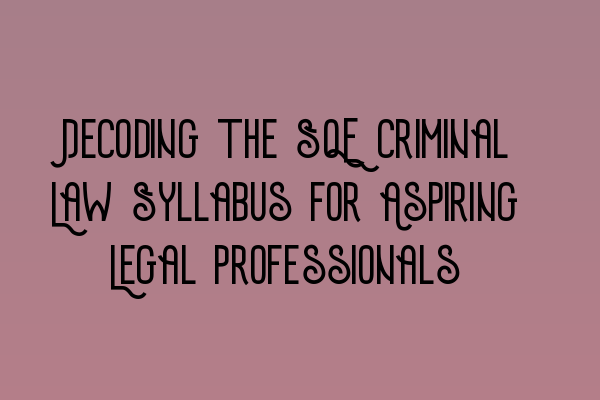Decoding the SQE Criminal Law Syllabus for Aspiring Legal Professionals
Aspiring legal professionals who wish to practice criminal law in the UK are required to pass the Solicitors Qualifying Examination (SQE), specifically the Criminal Law and Practice unit. This comprehensive examination tests candidates’ knowledge and skills in various areas of criminal law. To help you understand the SQE Criminal Law syllabus better, this article will provide a detailed breakdown and offer valuable insights.
The SQE Criminal Law Syllabus
The SQE Criminal Law syllabus covers a broad range of topics, including but not limited to:
- The principles of criminal liability
- Offenses against the person
- Offenses against property
- Defenses and mitigation
- Police powers and procedures
- Prosecution and pre-trial procedures
- Trials and sentencing
- Appeals and post-conviction procedures
- Professional conduct and ethics
It is essential for aspiring legal professionals to have a comprehensive understanding of these topics to excel in the SQE Criminal Law examination. Preparation is key, and there are various resources available to help candidates succeed.
Preparing for the SQE Criminal Law Examination
To prepare effectively for the SQE Criminal Law examination, aspiring legal professionals should consider the following:
- Enrolling in SQE 1 and 2 preparation courses, which provide comprehensive coverage of the syllabus and offer valuable practice materials. These courses can significantly enhance your understanding and improve your chances of success. As you prepare for the examination, it is highly recommended to utilize SQE 1 practice exam questions and SQE 1 practice mocks (FLK1 and FLK2) to familiarize yourself with the question format and assess your progress.
- Staying up to date with the latest SQE Criminal Law-related news and updates. As the examination may undergo periodic changes, it is crucial to rely on credible sources and stay informed to ensure you are studying the most relevant material.
- Developing strong analytical and problem-solving skills. The SQE Criminal Law examination will require you to analyze complex legal scenarios and apply your knowledge to practical situations. Practice-based learning and critical thinking will be instrumental in your success.
- Taking advantage of available resources, including textbooks, online articles, and legal databases. These resources can provide detailed explanations, case studies, and additional practice questions to help you deepen your understanding of the topics covered in the syllabus.
- Familiarizing yourself with the SRA SQE Exam Dates to plan your preparation effectively. It is crucial to allocate sufficient time for studying and revision leading up to the examination.
By following these strategies and utilizing the available resources, aspiring legal professionals can decode the SQE Criminal Law syllabus and maximize their chances of success.
Conclusion
The SQE Criminal Law syllabus tests candidates’ knowledge and skills in various areas of criminal law. To excel in this examination, aspiring legal professionals need to have a comprehensive understanding of the syllabus and prepare effectively. Enrolling in SQE 1 and 2 preparation courses, utilizing practice materials, staying updated with the latest news, developing analytical skills, and utilizing available resources are key steps to succeed in the SQE Criminal Law examination.
For more information on SQE 1 and SQE 2 preparation, you can check out these related articles:
- SQE 1 Practice Exam Questions
- SQE 1 Practice Mocks FLK1 FLK2
- SQE 2 Preparation Courses
- SQE 1 Preparation Courses
- SRA SQE Exam Dates
